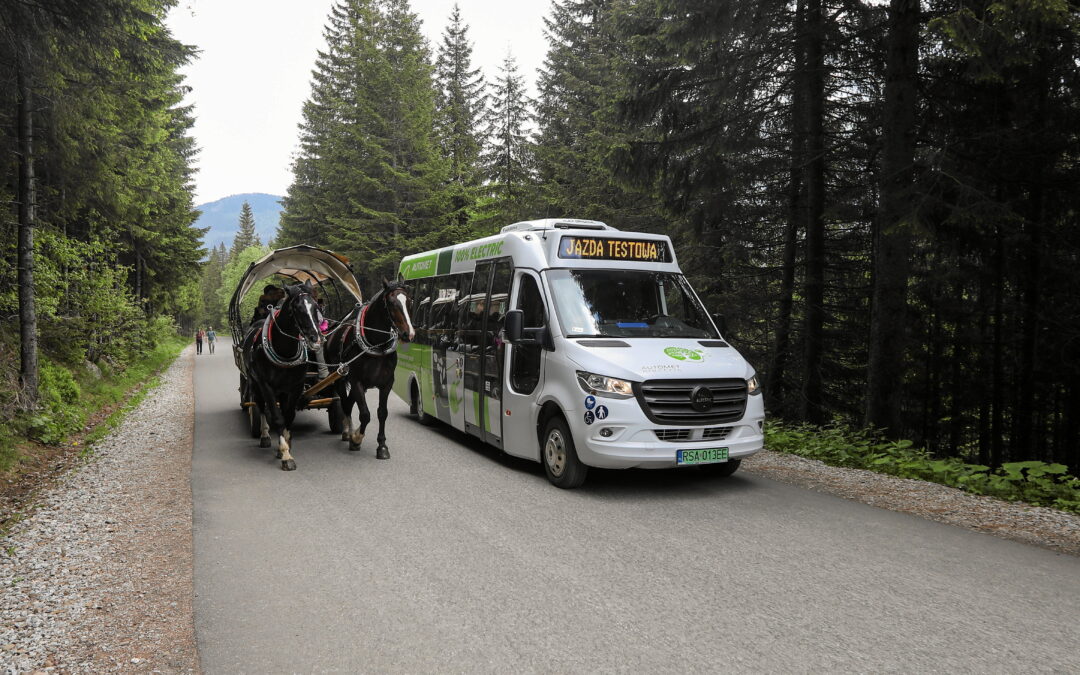A national park in Poland’s southern Tatra mountains has completed testing of an electric bus that could replace horse-drawn carts carrying tourists to Morskie Oko, a famous lake nestled between the mountains.
The programme was run as part of an agreement between coachmen and animal rights groups following a widely publicised recent incident of a horse collapsing along the route.
The government has launched an investigation after a coachman was seen hitting a horse that collapsed while transporting tourists in a mountain park
The coachmen's association defended his actions, saying he just "gave a slight stimulus" to help the horse https://t.co/sVyOyp3POt
— Notes from Poland 🇵🇱 (@notesfrompoland) May 6, 2024
The bus was leased for two weeks by Tatra National Park (TPN). The test period established that it performs well in mountainous terrain but its electric engine is too quiet, meaning it could be a threat to the hikers who walk the same route.
“Hikers walking along the trail cannot hear the vehicle coming from behind. You have to be very careful not to hit someone,” said the driver, Stanislaw Gąsienica-Kotelnicki, quoted by the Polish Press Agency (PAP).
“Because [this is] a national park, we do not use the horn here,” he added. “Sometimes, you had to shout out of an open window for tourists to get out of the way.”
“The vehicle has performed quite well when it comes to the battery,” added Zbigniew Kowalski of TPN. It was able to make six trips on a fully charged battery. However, the fact that it has space for only one wheelchair user is problematic, said Kowalski.
Skończyły się trwające 2 tygodnie testy busa na trasie do Morskiego Oka. Na jednym ładowaniu bus przejeżdża trasę 6 razy. W trakcie zjazdu doładowuje baterie (4%). Wykazano dwie wady. Jedna to za mało miejsca dla osób na wózkach – ciekawe, że brak specjalnego miejsca na ten cel w… pic.twitter.com/iM0XRwfixo
— Robert Maślak (@RobertMaslak) June 5, 2024
The park management said in a Facebook post that a key consideration in deciding whether to purchase such buses would be how the vehicles perform in winter.
“It is, therefore, still too early to declare on what terms and when it will transport passengers. We would certainly like to make transport available for people with disabilities first,” TPN said.
TPN also noted that, due to its high price, the purchase of such a vehicle would have to be preceded by fundraising and a tender. Other vehicles will also be tested in the coming months.
The park’s director, Szymon Ziobrowski, told broadcaster TVN that another problem is that local authorities may not give approval for a permanent bus line to run there.
The tests are one of the terms of a 12-point agreement between cart drivers and animal rights groups reached last month after a video showed a horse collapsing and then being hit by a coachman. The climate ministry, which pledged to investigate the incident, was also involved in the negotiations.
In addition to bus tests, it was agreed that, from 1 June, the passenger limit on the horse-drawn carts would be reduced by two adults and two children, and the horses will have a 60-minute rest when they reach Włosienica, about 1.5 kilometres from Morskie Oko.
The use of horse-drawn carts at Morskie Oko has long aroused criticism from animal rights groups. A number of cases of horses collapsing have been reported, with some documented on film. In 2020, two cart drivers were convicted of animal abuse in the first case of its kind.
In 2021, in a bid to improve animal welfare, TPN started testing a hybrid horse cart that uses a self-charging electric battery to assist the animals during tough uphill climbs.
A Polish national park is testing a hybrid electric cart that uses a self-charging battery to assist horses transporting tourists to a mountain lake, in an effort to improve the welfare of the animals https://t.co/8O8pCX40Vn
— Notes from Poland 🇵🇱 (@notesfrompoland) August 15, 2021

Notes from Poland is run by a small editorial team and published by an independent, non-profit foundation that is funded through donations from our readers. We cannot do what we do without your support.
Main image credit: Marek Podmokly / Agencja Wyborcza.pl

Alicja Ptak is deputy editor-in-chief of Notes from Poland and a multimedia journalist. She has written for Clean Energy Wire and The Times, and she hosts her own podcast, The Warsaw Wire, on Poland’s economy and energy sector. She previously worked for Reuters.


















